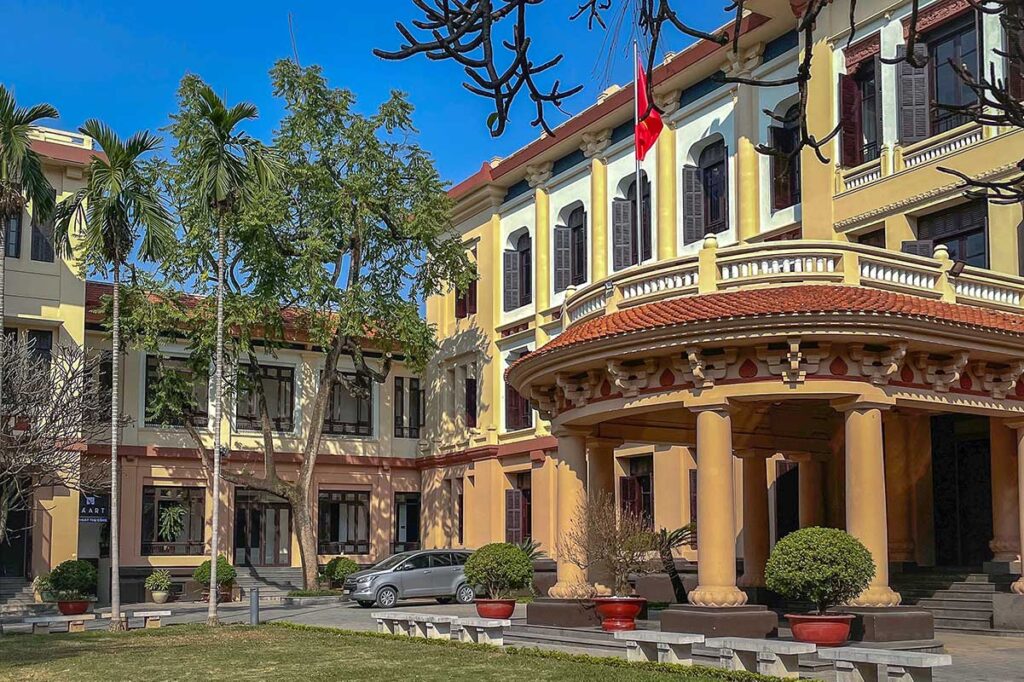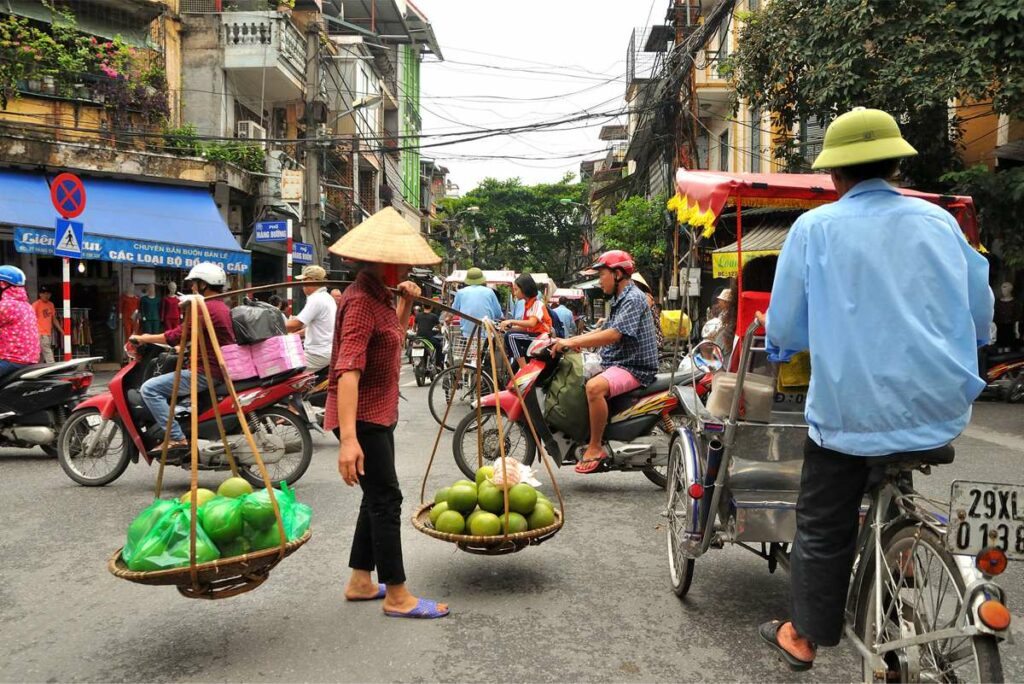Background & Layout
History of the Museum
The building that now houses the Vietnam Fine Arts Museum was originally built in 1937 during the French colonial period. It served as a boarding school for daughters of French officials living in Hanoi. In 1966, the building was officially transformed into a national museum dedicated to preserving and showcasing Vietnam’s fine arts. Since then, it has become the country’s most important art museum and plays a central role in protecting Vietnam’s artistic and cultural heritage.
Architecture & Building
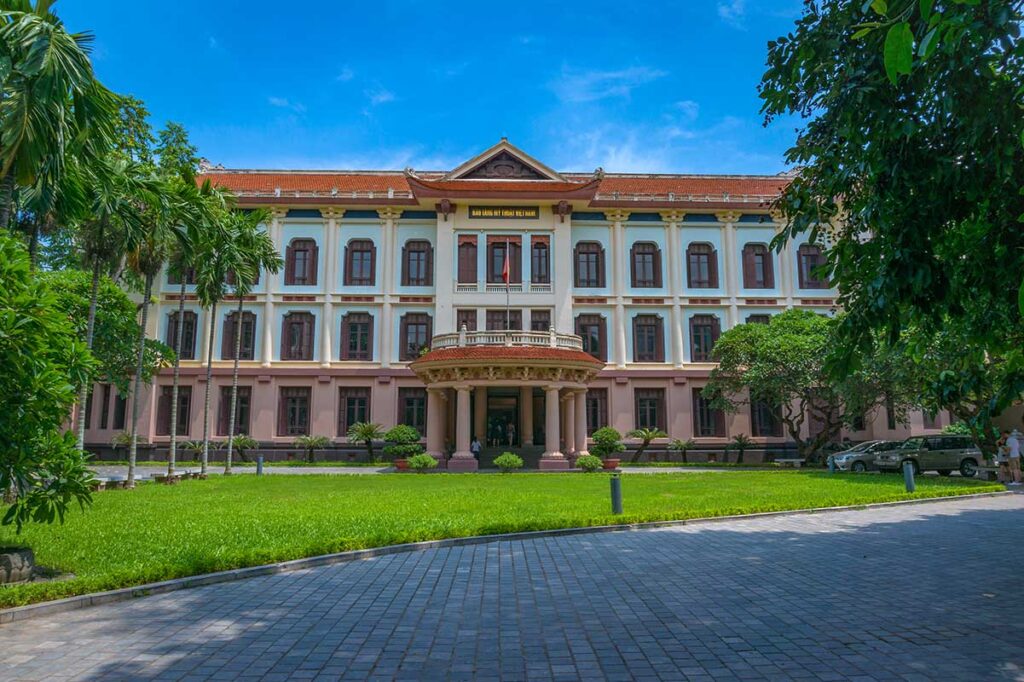
The museum’s architecture is a mix of French colonial and traditional Vietnamese design. It was influenced by French architect Ernest Hébrard, who was known for combining European and local styles. You’ll notice classic features like tall arched windows, wide corridors, tiled roofs, and decorative columns — all designed to keep the building light and cool. The structure is elegant but not overwhelming, and fits naturally into Hanoi’s historical cityscape.
What to expect inside
The museum is spread across two connected buildings, with three main floors of exhibition space. Most visitors begin in the main building, where the collections follow a clear timeline — starting from prehistoric art on the ground floor and moving up through different periods of Vietnamese history. The second building houses ceramic collections and occasional temporary exhibits.
Besides the art, there’s a small gift shop (including some original artwork), a family-friendly creative space for children, and a peaceful café with indoor and outdoor seating. Most rooms have air conditioning and are fairly quiet, making it a relaxing place to explore. The layout is logical and not too crowded, so even if you’re not an art expert, it’s easy to follow and enjoy.
Highlights of the Vietnam Fine Arts Museum
The Vietnam Fine Arts Museum covers a wide range of artistic styles, materials, and time periods. The exhibitions are organized by theme and era, making it easy to explore even if you don’t have an art background. Below are the main highlights to look out for during your visit.
1. Prehistoric and Early Fine Arts
Start your visit on the ground floor with some of the oldest artifacts in the museum. These include tools, carvings, and small statues from the Stone Age and Bronze Age. While the art is simple, it gives a glimpse into early Vietnamese life and beliefs. Some pieces date back several thousand years and are displayed with basic explanations in English.
2. Champa, Khmer and Buddhist Sculptures
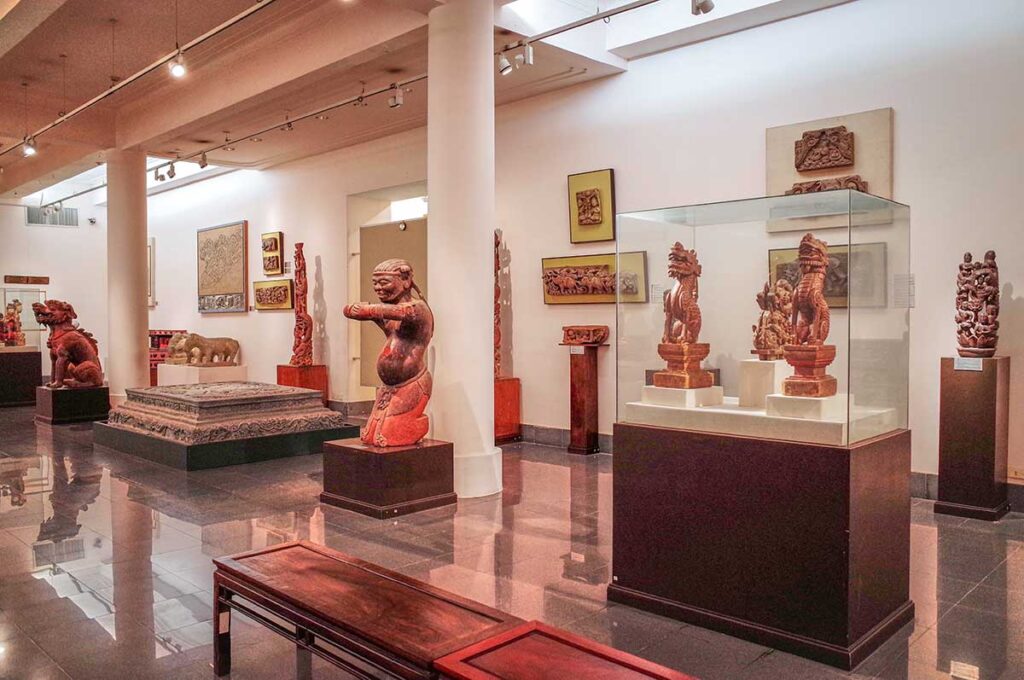
Next, you’ll see religious sculptures influenced by Hindu and Buddhist traditions, especially from the Champa and Khmer cultures. These include stone carvings of gods, dancers, and mythical creatures.
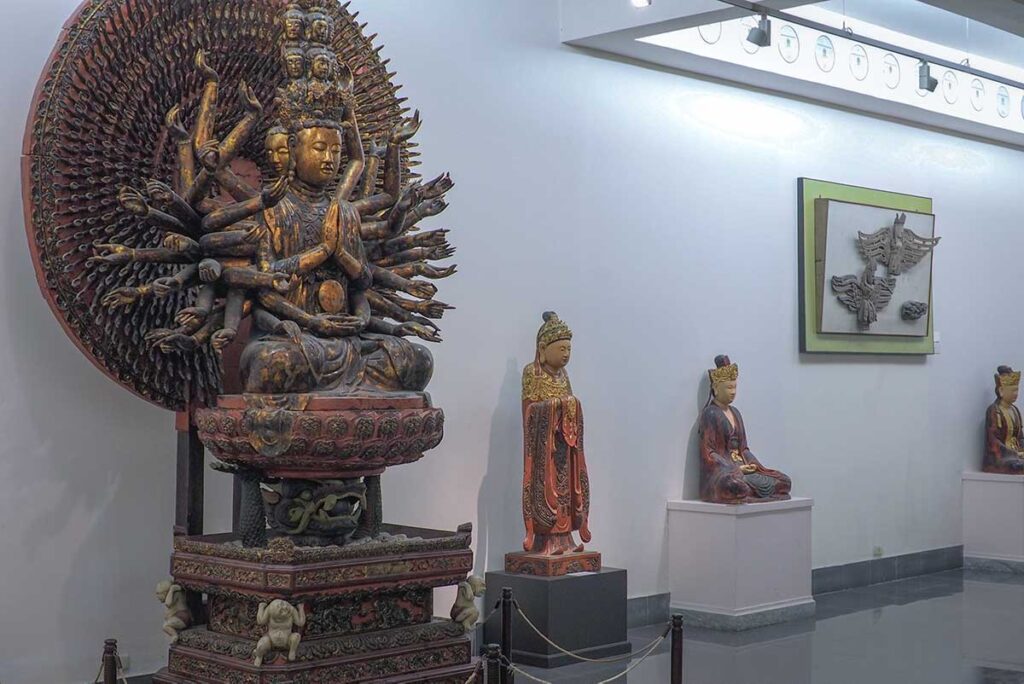
One of the most impressive displays is the wooden statue of Quan Âm — the thousand-eyed, thousand-armed Goddess of Compassion. You’ll also find lacquered statues of Buddhist monks from the Tay Son dynasty, known for their peaceful facial expressions and lifelike detail.
3. Lacquer, Silk & Oil Paintings
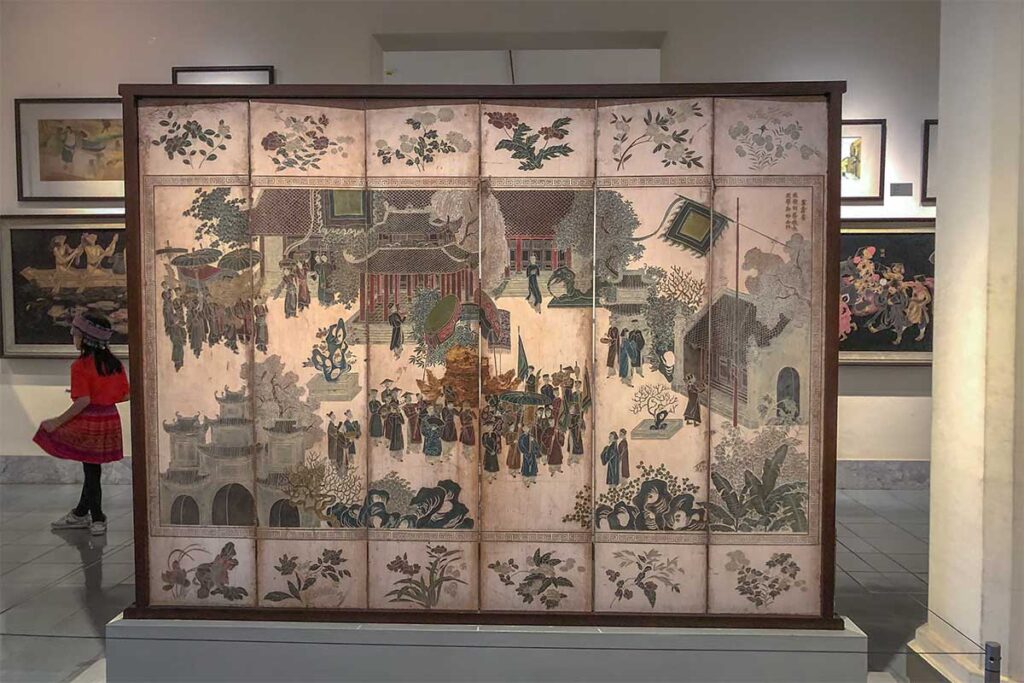
Vietnam is famous for its unique painting styles, and this section showcases the best of them. Look out for lacquer paintings made with eggshells and tree resin — a Vietnamese specialty that’s both beautiful and technically complex. You’ll also see delicate silk paintings and bold oil works. Some of the best-known Vietnamese painters are featured here, including To Ngoc Van, Bui Xuan Phai, and Nguyen Gia Tri. These rooms are often a visitor favorite.
4. Revolutionary & Patriotic Art
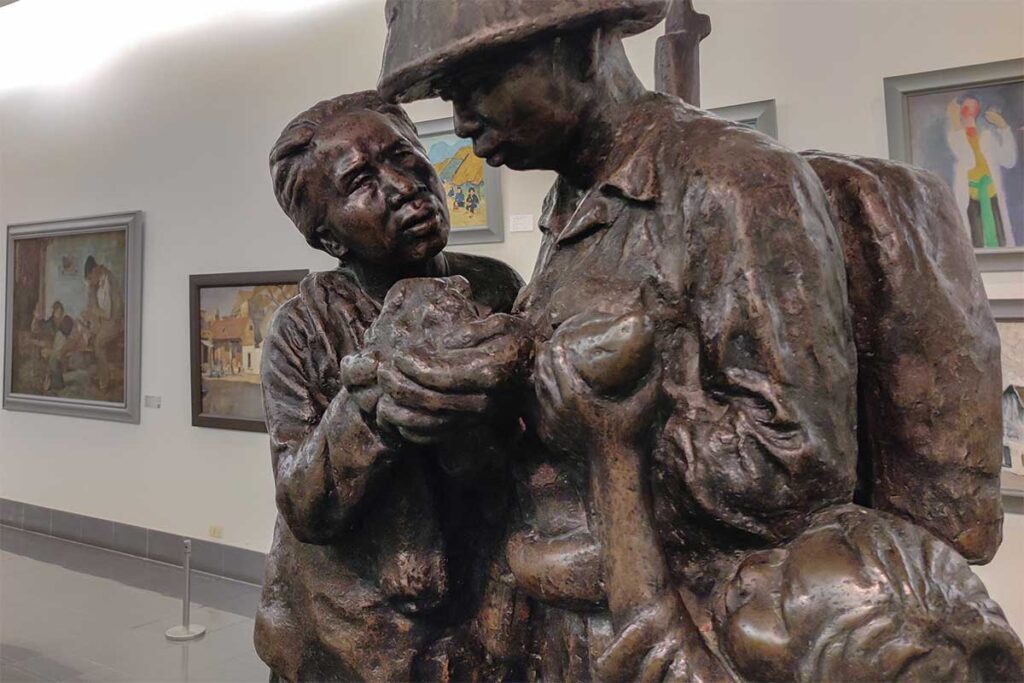
A large part of the museum focuses on art created during Vietnam’s struggle for independence and war periods. These paintings often show heroic soldiers, countryside life, or emotional family scenes. Some were used as propaganda, while others tell personal stories of loss and courage. Even if you’re not into politics, these works help explain Vietnam’s modern history in a powerful visual way.
5. Folk Art and Traditional Applied Arts
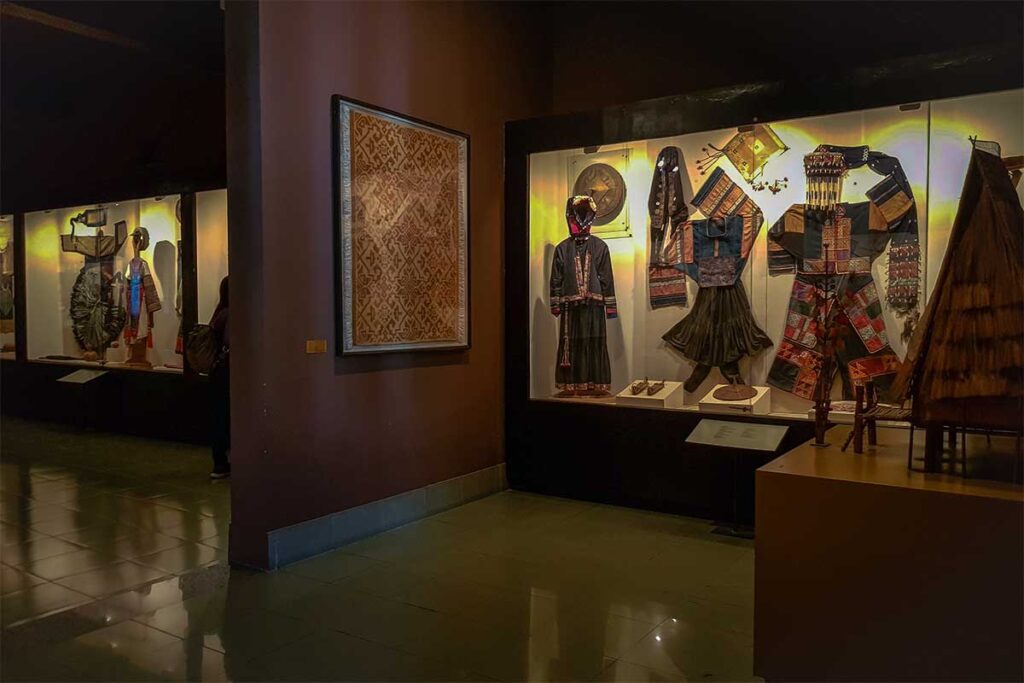
This colorful section is full of everyday art made by local communities. You’ll find paintings from villages like Dong Ho, Kim Hoang, and Sinh — often used for New Year celebrations or spiritual purposes. The art is simple and playful, showing animals, family life, or legends. There are also woven textiles, ritual objects, and wooden carvings that reflect Vietnam’s diverse ethnic traditions.
6. Ceramics Collection (11th to 20th Century)
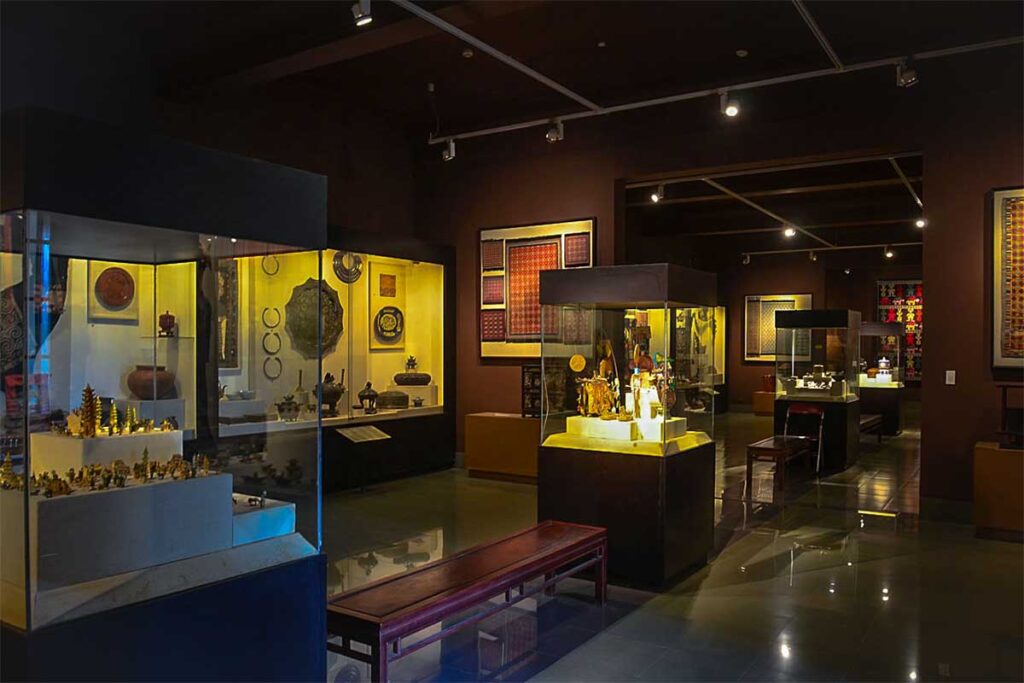
If you enjoy pottery, head to the second building where the ceramic collection is displayed. You’ll see pieces from the Ly, Tran, and later dynasties, including crackle-glazed pots, celadon bowls, and blue-and-white porcelain. The designs are elegant and show how Vietnamese ceramics changed over time. This part is often quieter and great for taking your time.
7. Temporary & Contemporary Exhibitions
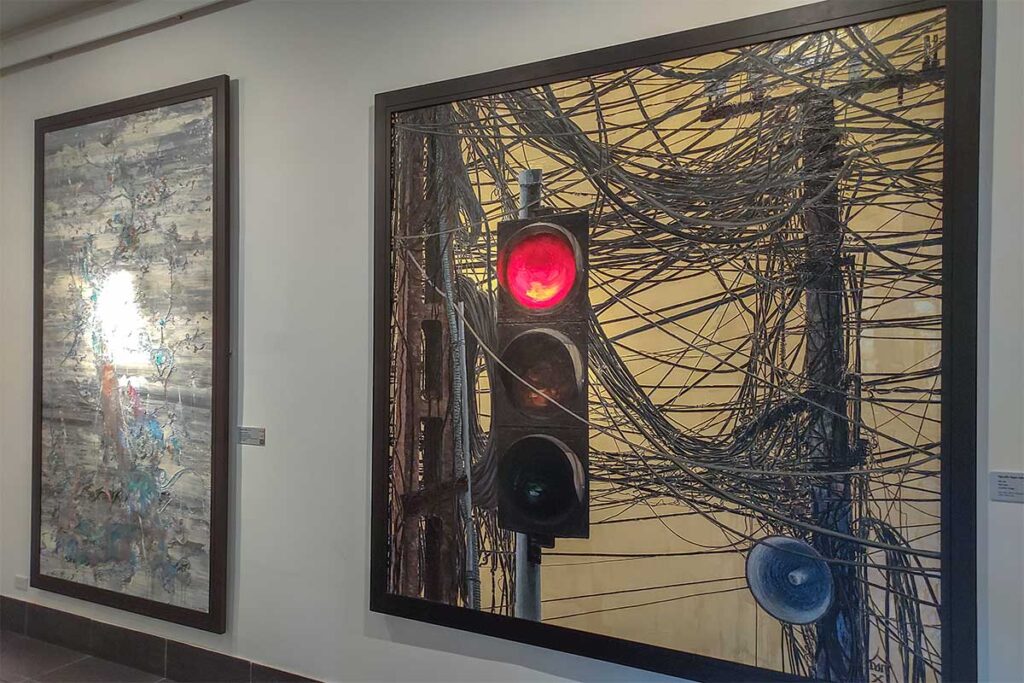
The museum also hosts changing exhibitions, usually on the upper floors of the second building. These displays include modern Vietnamese art, student work, or themed showcases. Styles can range from traditional to abstract. Some visitors find this section less exciting, as it tends to follow safe or official themes, but it’s worth a quick look if you’re curious.
8. Creative Space for Children
If you’re visiting with kids, don’t miss the Creative Space for Children on the third floor. This area is designed for ages 5–15 and offers hands-on activities like drawing, collage, and simple sculpture. It’s open daily from 9:00–11:30 and 14:00–16:30, and costs 50,000 VND per child. It’s a great way for children to learn about Vietnamese art while having fun.
Visiting information
Opening Times
The Vietnam Fine Arts Museum is open from 8:30 AM to 5:00 PM, Tuesday to Sunday. It is closed on Mondays.
If you plan to take a guided tour, note that there’s a lunch break from 11:30 AM to 1:30 PM, during which no live tours are available.
Entrance Fees
Tickets are very affordable. Prices are as follows:
- Adults: 40,000 VND
- Children (6–16 years): 10,000 VND
- Children under 6 and disabled visitors: Free
Tickets can be bought at the entrance without needing to book in advance.
Audio guides & Tours
There are two main ways to explore the museum with more background information:
- Smart Guide App (iMuseum VFA):
- Price: 50,000 VND (adults), 30,000 VND (students)
- Available in 9 languages: English, Vietnamese, French, Chinese, Japanese, Korean, Spanish, German, Italian
- Bring your own phone and headphones
- Live Guided Tour:
- Price: 150,000 VND per group (up to 25 people)
- Available in English, Vietnamese, or Chinese
- Best to call ahead or ask at the ticket desk for availability
- Tours are not available during the lunch break (11:30 AM – 1:30 PM)
Facilities & Accessibility
The museum has basic but sufficient facilities:
- Toilets: Available and generally clean
- Lockers: Large bags can be stored at the entrance
- Air Conditioning: Most rooms are air-conditioned, a welcome break from Hanoi’s heat
- Gift Shop: Small shop with books, art prints, and souvenirs
- Café: Open daily from 7:00 AM to 10:30 PM, with both indoor and outdoor seating — a nice spot to relax after your visit
Accessibility is moderate:
- The museum is not fully wheelchair-accessible in all areas, but many sections can be reached with help
- Stairs may be difficult for visitors with mobility issues
- Families with children should have no problem navigating the space
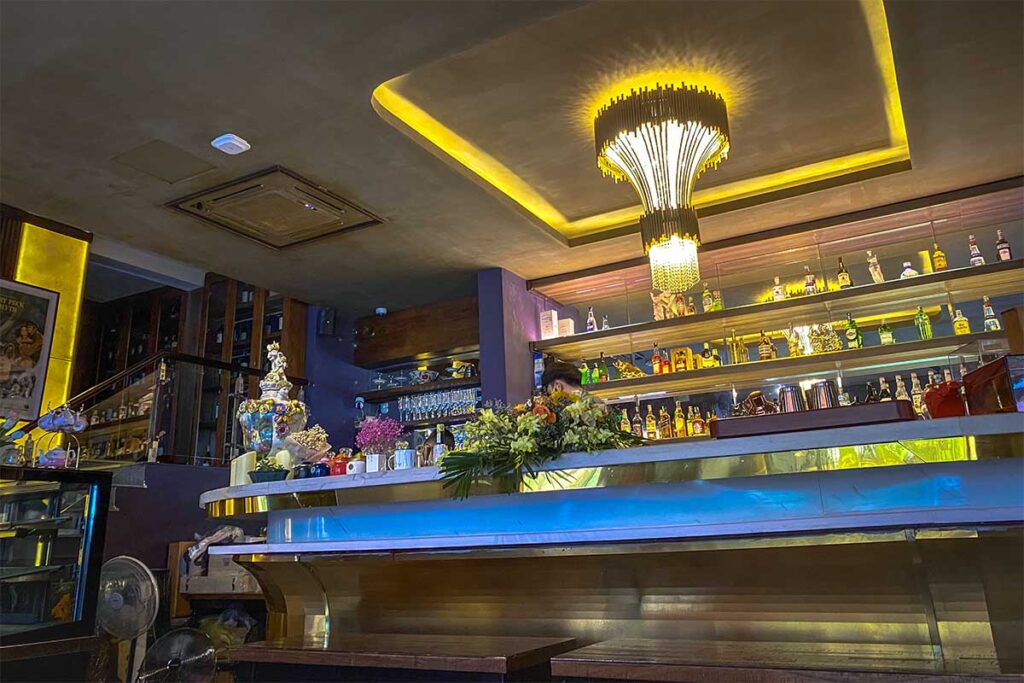
Time needed to visit
How long you stay depends on your interest:
- A quick visit takes about 30 to 60 minutes, just to walk through the highlights
- A more in-depth visit with an audio guide or live tour usually takes 1.5 to 2.5 hours
- If you’re an art lover or want to visit both buildings and the children’s space, you might spend even longer
There are benches inside the museum for taking breaks, and the relaxed atmosphere makes it easy to go at your own pace.
Location and Getting there
Where is the museum?
The Vietnam Fine Arts Museum is located at 66 Nguyen Thai Hoc Street, in Ba Dinh District, Hanoi. It’s right across the street from the Temple of Literature, making it easy to combine both in one trip. The area is central, safe, and close to many other historical sites.
How to get there
The museum is easy to reach from anywhere in central Hanoi:
- By taxi or Grab: This is the most convenient option. A ride from the Old Quarter usually takes about 10–15 minutes.
- On foot: If you’re already near Temple of Literature or the Ho Chi Minh Mausoleum, the museum is within walking distance. It’s also a nice walk if you’re staying in the French Quarter.
Nearby sights to combine it with
You can easily plan a half-day or full-day itinerary around the museum. Here are some nearby places worth visiting:
- Temple of Literature – Right across the street; a peaceful historical site and former university.
- One Pillar Pagoda – Unique Buddhist temple on a single stone pillar, about a 10-minute walk away.
- Ho Chi Minh Mausoleum – See the resting place of Vietnam’s national hero; about 15 minutes on foot.
- Hoa Lo Prison – Also known as the “Hanoi Hilton,” this former prison is about 10 minutes by car.
➤ For more inspiration, check out our full guide to the Best things to do in Hanoi.
Is it worth visiting?
Yes — the Vietnam Fine Arts Museum is definitely worth visiting if you’re interested in Vietnamese culture, history, or traditional art forms. It’s not a large or flashy museum, but it offers a peaceful atmosphere, a well-organized layout, and a unique perspective on Vietnam’s past through its artwork.
It’s especially enjoyable for art lovers, history buffs, or anyone curious about Vietnamese identity and heritage. The lacquer and silk paintings are often a highlight, and many visitors appreciate the storytelling in the wartime and folk art sections.
However, this museum may not be for everyone. If you dislike figurative art, realism, or are expecting more experimental or modern works, you might find some sections repetitive. The contemporary collection is limited and tends to follow official themes, which can feel a bit dull compared to more daring galleries elsewhere.
Still, the museum remains a calm, affordable, and enriching place to explore — especially if you’re already nearby or looking for a cultural break from Hanoi’s busy streets.
